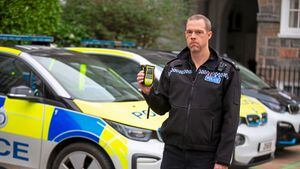Plans to introduce roadside tests for drug-drivers
Roadside tests for drivers under the influence of drugs could be brought in alongside advanced roadside tests for alcohol as part of new laws aimed at making the island’s roads safer.

Home Affairs is looking to introduce a number of new road traffic laws which will include new offences such as causing death or serious injury by careless or inconsiderate driving.
Roads policing inspector Tom Marshall said that the overall aim of the proposals is to make the island’s road safer for all users, from drivers to pedestrians.
‘Legislation was changed in the UK quite a few years ago so part of it is about us catching up on that,’ he said. ‘There have been a few areas that needed some improvement.’
One change would see the introduction of roadside testing for someone suspected of being under the influence of certain illegal or prescribed drugs, called a drug wipe.
‘That will then give us a specific power of arrest,’ said Inspector Marshall.
If the test is positive the driver would be taken to the police station where a blood sample would need to be given.
Roadside breath tests for alcohol are not able to be used as evidence in court at the moment and if a driver fails the test, given on a small hand-held unit, they are taken to the station where a large intoximeter is used to secure an evidential sample for the courts.
‘The current evidential breath test machine is bigger than this desk,’ said Inspector Marshall.
‘But there is new technology that will hopefully be type-approved soon. That will be the size of an A4 ring binder so that can then sit in the back of a police car.’
This would also reduce the delay between a driver being stopped and an evidential test being taken.
With breath tests now seen as providing good evidence, there would no longer be an ability for any motorist to request that a blood or urine sample be taken, although in some circumstances officers could still request that one or other of these is taken.
New laws that could be brought in if the proposals are approved include offences for causing death or serious injury by careless or inconsiderate driving, and Inspector Marshall said the need for these arose out of the only similar offence being causing death or serious injury through dangerous driving.
‘It meant that the courts didn’t really have the penalties that they needed,’ he said.
‘So that’s why the proposed new offences have been introduced, with the hope of giving the court some higher sentencing powers in those circumstances.’
In 2023, police arrested a total of 90 motorists for drink-driving, compared to 111 in 2022.





